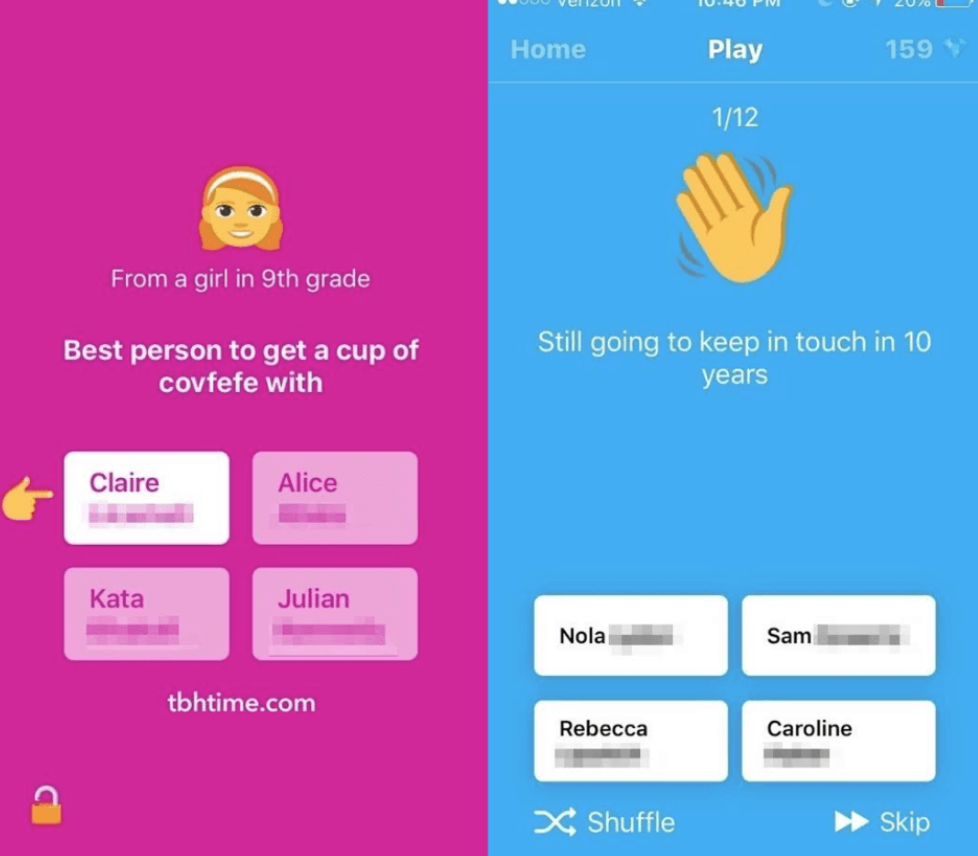By Maya Brodows and Caroline Donohue ’20
Milei Wyatt ’20 is said to be “smarter than google” according to the anonymous TBH app.
Wyatt was also voted “most well-read,” “could solve a global conflict,” and a “cute nerd tbh.”
All of these comments originate from the new app “TBH” which has grown popular in the span of a few weeks throughout the Staples community. TBH, an acronym for “to be honest,” aims to promote positivity through anonymous voting.
When opening the TBH app, the user is given a question with four names to choose from. They are supposed to click on the name they feel best matches the question. The questions range from “best smile” to “one person you can count on.” The people selected are notified once chosen.
Sarah Sherts ’18 is one of the Staples students keeping up with the rapidly growing trend.
“It really boosts people’s confidence in themselves to have anonymous people thinking good things of them,” Sherts said.
In the past, similar apps such as Yik-Yak and Whatsgoodly have sparked online harassment and in lots of cases, bullying. These apps allowed for students to create their own posts without having their names tied down to it. This anonymity allowed for students to post hurtful comments with virtually no repercussions.
The TBH app does not give users the option of creating their own poll as a way to deny bullying. Instead, all polls are computer generated and positive.
Nikita Bier, the co-founder of TBH, hopes the app improves teenager’s mental health. The purpose behind TBH has earned the app a lot of positive feedback. However, some Staples students find the anonymous polls to be pointless.
`
“It’s someone you don’t even know saying something about you. I don’t know who said [the compliments], so it doesn’t really make a difference,” Jax Adler ’20 said.
Carly Dwyer ’20 shared similar beliefs. “I realized it may make you feel good but most people are not putting a lot of thought into who they’re choosing. For example, if it says ‘bestie for life’ and really none of the choices are your best friend, you just chose a random person,” Dwyer said.
Other students at Staples argue that this seemingly harmless app has become a distraction.
“It’s not really a good use of time. I know a bunch of people who are like ‘I’m waiting for my 45 minutes to answer questions to come up’ than yeah you’re wasting your time,” Xander Winser ’19 said.
Despite all these negative viewpoints, Sherts remains confident in the app’s abilities. “I have heard stories of people who have have an increase in self esteem from this app, although I think it is making bigger waves in the underclassmen and middle schoolers,” Sherts said.
Ben Klein ’21 believes if these compliments were said in person, and not anonymously over an app, students would be even more impacted. “Why don’t you just talk to people instead of doing the app?” Klein asked.
It seems that many students don’t have an answer.
Nevertheless, whether one finds the app to be a confidence booster or a waste of time, it probably won’t be long before a new app is released and TBH is forgotten.
“It’s nice to feel good,” Wyatt said, “And even though it may be kind of a stupid app that we will all forget soon enough, everyone could use more compliments in their lives.”













































